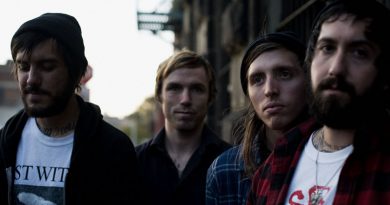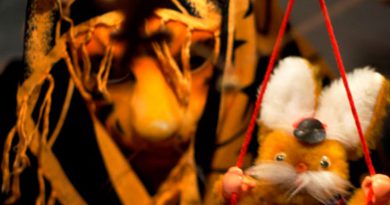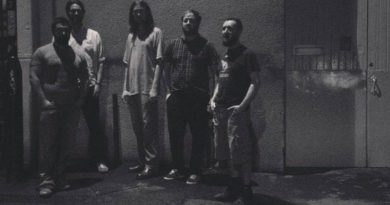In Search Of Tone: Aaron Lewis Of When The Deadbolt Breaks
Creating unique music is a tough task these days and a lot of it comes from a variety of influences. Aaron Lewis of When The Deadbolt Breaks has no shortage of influences. As stated below, he discusses Frank Sinatra, David Bowie, Industrial Metal and even an INXS cover as influences in his music. He also has played in hardcore bands, doom metal bands and was even a DJ for some time. All of these aspects really help create the amazing sounds heard throughout their albums.
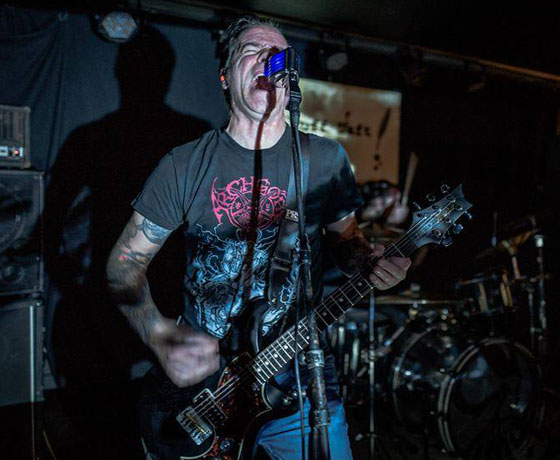
Aaron taught me a great deal about how to approach songwriting and listening to certain aspects of a song to spark ideas. He’s extremely knowledgeable about gear as well. He has inspired me to start working on my own original material and I even took his advice and bought a new pedal!
Thanks Aaron for taking the time to talk with me. Let’s just jump right into gear. What amps are you currently using?
As for amps, my main go-to is a first generation Sunn Model T. I go back and forth between that and a Hovercraft Falcon. Recently I got a Sunn Enforcer that I’ve been using for recording, but I doubt it will ever see the stage.
When dialling in on your tone, do you use a clean tone or add a little distortion from the amp?
Totally clean. I’m a snob when it comes to amps. I want a tube amplifier and I want big tubes in it and I want it clean. I don’t want amp distortion. I get all of my distortion and fuzz from my pedals. As long as I have a clean amp with a good tone to it and a lot of headroom, then the rest of my sound come from my pedals. Everybody is different and there are plenty of amps that have great sound and distortion. I however, cannot get the Deadbolt tone by doing that.
Also, with a super clean amp like that, once you kill the fuzz then there’s a huge contrast in sound. You went from this abrasive grinding fuzzy noise to perfectly clean and pretty sounding tone. That’s what I go for is the complete contrast.
I feel like your clean tone also has a heavy feel. It’s a cool sound.
That’s partially from the tuning and also comes from the neck pickup. Having a model T with KT 88’s in it, it’s got a lot of low end to it so it gives you that that warm sound you’re describing.
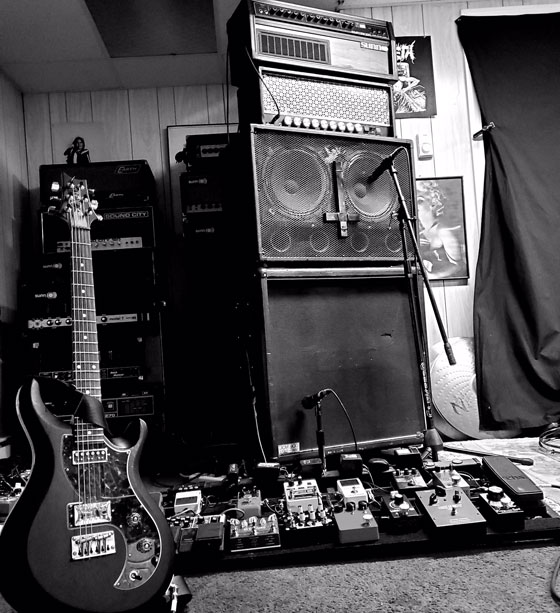
I’m constantly looking at new guitars and have a small collection of my own. Do you have a large collection or a few main guitars?
For guitars, I mainly use a PRS Vella. It seems to hold the tuning well because we tune real low. I don’t use super heavy strings. I like to keep the strings on the loose side because it gives them an interesting sound when you hammer on it. I have tried 13 gauge strings, 11 gauge strings and I stick with 10s, for what we are tuned to, those are really light strings. The strings almost go out of tune a little bit if you hit the open string pretty hard, which I do. I hammer on the guitar when I play and it creates this kind of wavering sound that I really like, where the strings kind of go out of tune for second then come right back. For me, it adds to the feel of everything.
I never used to like PRS. I was in the market for a new guitar and I thought I wanted this Gibson SG, then I went and played one and I thought I really fucking hate this guitar. The guy working was PRS dealer and he said for me to try the PRS Vella. I like primarily heavy guitars, I have two Gibson Les Pauls and I love those. I have a Fender Telecaster and a G&L Strat which is are great guitars. So this is the lightest guitar that I’ve ever played, when I picked it up I thought I’m probably going to hate this thing but then I started playing it. It plays like butter and sounds like a Les Paul, I mean it just it blew my fucking mind. At the time, I was making really good money, so I bought it. It was around 1800 bucks and I liked it so much that a couple weeks later I went back to get a second one for my other band [laughs].
You mention that you have a Strat and a Telecaster. Do you have a preference in pickups? Single coil vs Humbucker?
I play a lot with neck pickup. With the G&L Strat, I put in hotter pickups, which at the time I thought was the way to go because I wanted fuzz and a dirty sound, I don’t want a clean sound, I want a nasty sounding tone. So I put the hottest pickups I could find in. It sounds great, it has a nasty snarl to it, but, later on as I got older, I learned that the better way to do that is to put the not so hot pick up’s in the guitar and draw the power from the amp and the pedals pushing the amp. I do like single coils, I’m not anti single coils at all. They have their place.
I have a Telecaster and I find I go back to that guitar very often. It has a really unique tone I can’t get with my other guitars.
Telecasters are unique. I’m in a heavy doom style band and I use a telecaster [laughs]. It’s not really meant for that, but, they sound amazing for heavy riffs. They have that tone and that sound that’s so fat and so fucking warm.
When I first got my Telecaster, it’s ugly, its powder blue, it’s got sparkles and a mirror pickguard [laughs]. When I first saw it, I was younger and looking for a metal guitar. I wanted something heavy and I was trying all sorts of guitars, like ESP’s and Hamer’s and I hated each one of them. Jimmy Bell, who plays with Metal Church, he hands me a guitar and says try this telecaster. I said ‘Are you kidding me, this thing is ugly. I don’t want to be seen with that.’ He said ‘Try it.’ I said OK, I tried it and plays nice man, but, it’s ugly and I handed back.
I tried another guitar and another guitar and something else and he hands me the Telecaster back. Every time I play it, it gets better and better. He then says let me tell you a story. He tells me that they were on tour and he had the guitars all strapped to the top of the van. It was winter, it’s snowing out and the roads are really bad. Now, I don’t even know if the story is true, but, it definitely sold me on the guitar. So they are driving down road and they get into an accident. The band hits a tree or whatever and the guitars go flying off the van and the telecaster flew out of the case. It hit the tree and opened up. It’s laying there, covered in snow and he walks over, picks it up, smacks it against the tree, puts it back in the case, and they head out to the gig. When they played the gig with it, he said it never went out of tune. I thought it was a cool story, so I walked out of the store with that guitar.
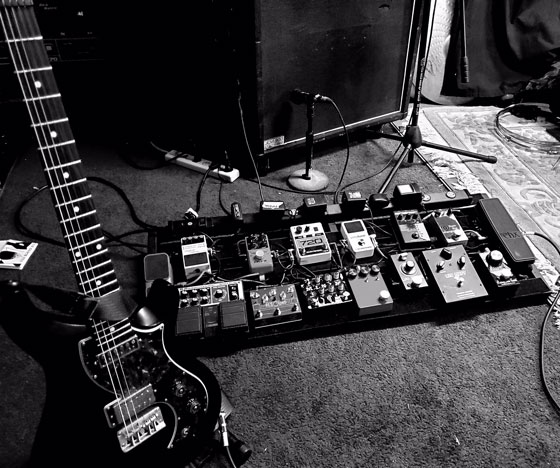
There are an endless amount of pedals with more built every day. What has made it to your pedal board?
It’s blurred out but I’ve got an actual display case behind me that’s just loaded with pedals. I’m kind of a gear junkie to a very bad fault [laughs]. Right now on my board I have three different fuzz pedals, distortion pedals, three different delay pedals, two different reverb pedals, and a tremolo pedal. I can give you the rundown and go through each if you want.
Of course!
OK! My go to for fuzz or distortion, for a while now, has been the EarthQuaker Devices Acapulco Gold. It is between that and like you know the earlier ProCo Rat’s, but the Acapulco Gold is excellent if you have a tube head with a lot of headroom. The amp mentioned earlier, has bigger tubes so you have a lot of headroom which means it takes a bit to push those tubes over the edge. The Acapulco Gold is a very loud pedal and it gets very loud, very quick. It has a single giant knob for control.
One of my biggest pet peeves about fuzz pedals is that you lose that natural tone of the guitar sometimes, like in Big Muffs. I’ve never been a real big, Big Muff fan except for maybe the older ones. Big Muff’s have their uses, but I feel that you lose that natural sound of the guitar and clarity. The Acapulco Gold and theRat pedals get real vicious real quick, but they keep that natural sound. With that being said, I do have an old Russian Big Muff. One of the big black and yellow ones that was modified for me a little bit by my buddy at PLX FX. I tend to go back and forth between the two of those.
I also I have a Ram The Manparts by Fuzzrocious Pedals. In this one, it has this weird, I don’t even know what it’s called, it’s some kind of weird diode, where if you put enough energy through, it totally distorts or destroys the initial sound of your guitar. It makes it sound like its being played through a bad speaker. It only has a couple of uses as far as that goes, but you can get rid of that sound and actually it’s got a really nice distortion to it. Mainly, I’m using it on my pedalboard for that weird blown speaker kind of fuzzy sound.
I’ve been really looking to good vibe pedals, something that gives you that Sons of Otis, or Jimi Hendrix, type of univibe sound like a ’68, ‘70 kind of univibe sound. So I talked to my buddy over at PLX FX again, he found a good Schematic and a good board and he actually built new custom one the way I wanted it. I use that for some of my solos on the newer record. I’ve got a couple different reverb pedals. I have a Cusack Resound Reverb which has a really thick, lush sound; it’s a trippy fucking pedal. I just added an Old Blood Noise Endeavors reverb pedal which has reverse reverb, combining the two pedals and depending on what order you put them in, it can make some really, cool weird noises. I can keep going if you want me too [laughs].
Yes please, the more the better. I have a Boss Katana amp with pedals built in, but I’m starting to venture into purchasing pedals and create my own pedalboard. I’ve spent lots of time browsing so the more you can tell me the better.
It becomes an addiction. It sucks because there aren’t many stores anymore where you can try pedals out. So, in order to try them, you have to buy them. Before I pull the trigger, I go to YouTube and watch the demos. Somebody is always doing a demo on some pedal. For the most part you can get a good idea of what it’s going to sound like, but everybody has different gear, they’re not using it through the same gear that I have, so it’s obviously going to sound different. Some pedals that I had fucking high hopes for, I’m going to be like this is fucking awesome, the videos are great, then I plug it in and I’m like, that sounds like ass. I’ll try it through multiple amps and nothing I do makes it sound right. It’s definitely an addiction [laughs].
I have three different delays on my board right now. For years, delays have been my big thing. I’m starting to get more into reverbs and combining them with delay pedals. So I have more delay and fuzz pedals then I really should [laughs]. I’ve got the Boss Space Echo pedal. I really want one of those big old school Space Echo racks, but, it’s bulky and they’re super fucking expensive. With the Boss Space Echo, it does the same kind of thing, but in a pedal.
I love analog delays and TC Electronic actually does those really well too, but with the analog delays I like how the delay is going and when it’s repeating, it starts to decay and change the tone. With old school analog devices the tone gets more muffled as it goes, but, sometimes you can actually change that, where you lose low end as it goes and it starts to decay further that way, or you can add the high end, or you can add more low into it, so it becomes an exact repeat of what you’re doing. The Space Echo is neat because you can add an expression pedal to it. This way you program it where you could change the speed of the delay with the expression pedal.
Next, I have a NUX Time Core Delay, which is just a cheap Japanese delay pedal, but it has an analog sound too and it has reverse delay which is really nice. I bought it before we went on tour out west because I wanted something kind of cheap to take with me and had a small footprint so I could fit it on a small board in my backpack. It turned out to be a great pedal. I think I paid like 50 bucks for it and it has a really warm unique sound. It’s also very modifiable so I like that.
The last one I’ve got for delay is a Boss DD5 delay. That’s the very last delay in my chain and has unlimited repeats so that’s why I have it on there. We don’t stop in between songs live, we keep it going. At the very end of a song I’ll hit that, then whatever note I want and the decay keeps going and going. This allows us some time to kind of figure out what we’re going to do and lets the anticipation build as we go into the next song.
The only other pedal I have on here is an Electro Harmonix 720, a looper pedal and I put that on there because you can put samples on it and do live looping. As we’re playing, and we’re getting to the real psychedelic parts, I can record a section of my guitar riff while I’m playing, then immediately start playing it back, go into something different, then that part of the riff just keeps repeating over and over again. Then I can go off and do something else, it makes playing live even more fun for me.
I used to have a Cry Baby Wah, well I still have it, but I don’t use it that much. I ended up getting the Electro Harmonix Cockfight Wah because of the fuzz wah aspect. It has actual fuzz levels to it. So doing harmonies, or solos with this pedal, you can add fuzz to it, adding to the fuzz pedal you’re already using and it just makes it really intense and harsh sounding.
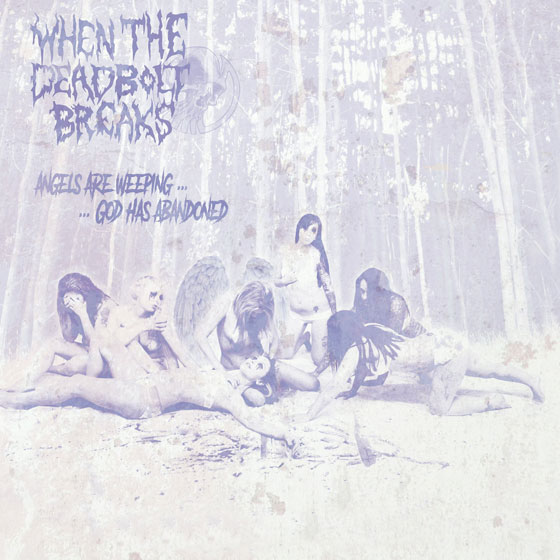
As I’ve mentioned while we were emailing back and forth, I would listen to the rest of your discography before we spoke. I’ll admit I lied, I cannot get past Angels Are Weeping… album. It’s really really good and I’ll just put it back on when it’s finished. I love the sound and I get a little bit of a Type O Negative Vibe. Are they an influence in some way?
When I was younger, I got into Type O Negative a little bit, but I hit a point where I didn’t really quite understand it as I was into different things, but as I got older I started getting back into it and I really I get it, especially vocally. However, it’s completely unintentional if you get a Type O Negative vibe [laughs]. My vocal heroes are David Bowie and Jim Morrison. I love the crooners as well. I don’t do it exceptionally well, but I like trying to add some of that stuff in there. David Bowie to me is the fucking all time greatest.
Playing Doom with Frank Sinatra and David Bowie as influences allows for unique music. Is this something you consider when writing music?
We’ve always looked at our music as unique and never wanted to pigeonhole the band as something in particular, like this is a death metal band or metal band or whatever. On top of the influences, each record has people on it that aren’t even in the band. They contribute certain different ideas. The idea was always whoever can bring whatever to the table and enhance the music in some way, for example, if a riff sounds something more like a country style, we then think of how we can use it, and try and make it sound like what we do. Eventually we figure it out and pretty much everything is fair game.
What is your writing process like when creating your songs and albums?
It really changes from record to record. For the most part it’s writing and recording simultaneously. That’s kind of been our MO for years. Hit it when it’s hot. I know the bands that I’ve been in and other bands that I know, they practice and practice and get it really solid before they get into the studio. I get that, but, that’s not the type of band we are because live on stage, we’re going to do something different anyway. We never played a song the same way live, we play parts of it live the same, but the rest of it, sometimes you just figure different things out
If we’re playing a part and it’s fucking hitting and you can tell the audience is into it, if it feels right we will extend it and keep going with it. We will start jamming out with a bit. There’s a lot of freedom in doing that. Writing has always been kind of the same way. Drifting Towards The Edge Of The Earth is a double disc we did. The drummer at that point, Rich, and myself got together in a weekend and got really fucked up on some wine and recorded shit.
We went on tour with Elder for eight dates down south after we recorded those ideas. When we came back, we listened to the shit and thought you know this is actually pretty cool, what do we do with it? It took almost a year because it was two records worth of material. The second CD was one song, which is almost an hour long, so it was tricky to figure out how to add these things and what we want to do. At the same time we had a brand new bass player, Mike so we were also trying to work that out.
Now, were in a whole different situation with the pandemic and we have a new line-up. I have a drum program on my computer. One thing we do now is I sit down and I hear these riffs in my head. I create the drum track for it, I record this riff with the drum track and I put the whole thing together. I send it out to the guys and say ‘hey what do you think?’ Our drummer, Rob, then puts real drums to it in place of what I’d done on the drum machine. He’ll rearrange it, if he feels the arrangement should be a little bit different and wants to change things up a bit, then sends it back. It’s like a fucking surprise to me when I listen. Then everybody adds their parts and they email it to me. It’s been really interesting putting it together this way. It’s moved so quickly as well. We have seven songs down right now that came out really fast using this process. They’re good songs and solid material. It’s a little more aggressive than what we’ve done in the past, but it’s been a unique experience this way.
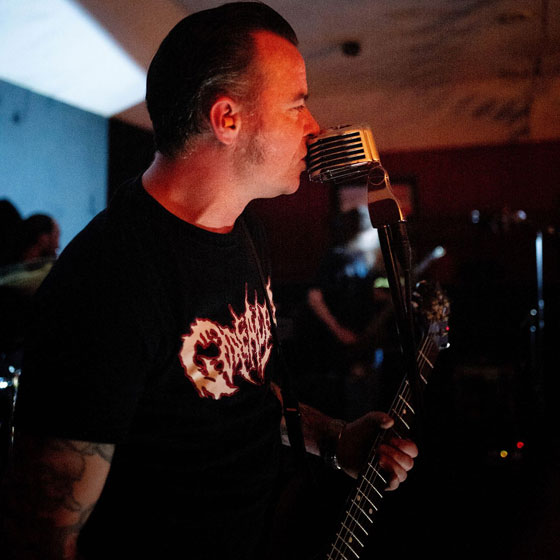
Do you tend to write more in a live setting or bring completed ideas to the studio?
If I had a riff or, Charlie or Mike does, we’ll bring it to practice, kind of jam on a little bit and see what happens, but at the end of the day, I tend to put more of the songs together on my own. I just sometimes I hear them in my head as the entire song and how I want the order to go with the lyrics. That being said, there are plenty of times where we will sit down and try and hammer out riffs and you know, see if we can add things, or put a bunch of riffs together and see where they could lead us. For the most part it’s just a weird process [Laughs].
I have many off days. It gets discouraging quick. What do you do to inspire yourself to play if you’re having an off day?
I am not a great guitar player by any means. I feel like I have those days a lot [laughs]. Maybe even more so vocally. I’m still learning a lot vocally, I’m trying to push myself and do things that I haven’t done before. For example, just an hour before we did this interview, I was recording here in my studio, trying to do some vocals for one of the new songs and the pattern that I hear in my head doesn’t necessarily fit to what the song needs. So I was trying it, then my key was off and it gets fucking frustrating. At some point, you have to step back and take a break.
One of the things that I do for vocals, or even for guitar, if I’m trying to figure out a solo, or harmonies, and my fingers won’t cooperate, or its not coming out the way I want it, I will go back to basics and for a couple days I’ll listen in my car. I listen to the drums and bass, or the drums, bass and the rhythm guitar and I’ll sing along with it. That tends to help me more than anything.
Sometimes just weird inspiration, for instance, in the summertime if we go cycling through the middle of the woods, in the middle of nowhere, looking at these nice farms and shit. Ideas kind of come to you. When I hear the ideas over and over and over again. After a couple of weeks, if I keep hearing this thing in my head, I’ll sit down and try it.
Inspiration comes in different forms I guess. You have to keep listening and not give up. Especially, with this new record, we don’t necessarily have a deadline but we have a label that wants to put it out. We just have to get everything together and stay persistent with it. I can’t give up on it, if I’m having trouble with a specific riff to specific vocal patterns, I’ll get it, it’s just going to take me a couple of times.
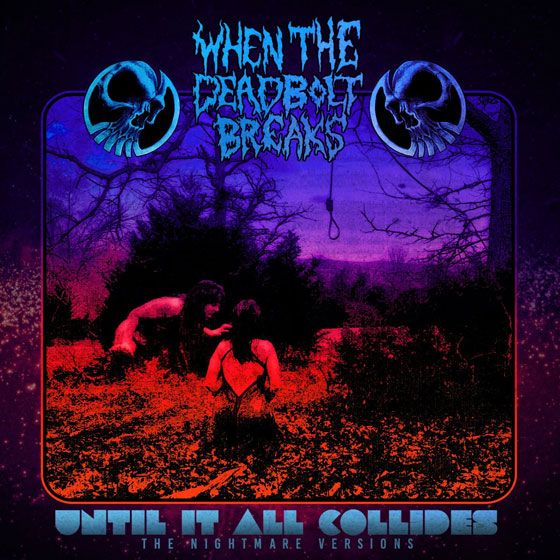
I tend to play the same little riffs over and over when I come up with an idea. I find I’m just making the same song over and over [laughs]. How do you create unique music without repeating yourself?
I get caught up in myself, especially with soloing because, I’ve been playing for a lot of years, I should probably be a lot better than I am. I hit a point, however, where, to me, it was more important to write a good song than it is to practice guitar. Maybe that’s a cop out, [laughs] I don’t know. I catch myself getting into the similar, or the same patterns of solos. I try and push myself past that and say ‘OK how do I flip this up a little bit, how do I make it weird or how do I, you know, take what I normally do and just expand on it?’ I’ll try to add a couple notes here and there and sometimes, even if I have trouble doing that, the other members in the band can do it for me.
The new drummer we have, Rob, he’s definitely helped propel the new record into a direction that I’ve wanted to go for a while now. It’s actually very similar to a lot of the older stuff we’ve done but, we’re adding more blast beats, it’s getting more aggressive, the quieter mellower trippy stuff is getting even more mellow and trippy. There’s patterns that he can play on the drums that is new for this band, and it is new for me. It’s all of a sudden opening this whole different world that we didn’t have before. So that’s pushing us to write and kind of getting out of those stereotypical patterns that we were doing before.
Another thing would be, listening to different styles of music. I don’t listen to strictly heavy music. I listen to a lot of 70s psychedelic rock, techno, industrial and weird shit. Also, a lot of doom and black metal. I listen to a bunch of everything, so that kind of helps too because you hear different things. For example, INXS did a cover of Passenger by The Stooges and I love their version. It’s a really fucking great version but, the drum beat man, the drum beat really fucking got me. I was like holy shit when I heard it.
I then talked to Rob and mentioned I wanted to do something along the lines of Passenger. Not the song, but I wanted to do something with this idea of a drum beat. I did a basic pattern on my drum machine and said ‘OK, this is kind of what I want to do’. It’s not the same thing, but, it’s the same feel and I sent it to him and again, made magic with it, made something incredible out of it. So that in itself is a little bit different than what we’ve done in the past.
Is there a song you’re particularly proud of?
Some more so than others definitely, but, probably Color The Sun. That song was actually the first song that I ever wrote for the band. It was written before When The Deadbolt Breaks was even a thing. I was a DJ back in the late 90s with a buddy of mine. At the time, I had written that riff, which is really slow and melodic. I brought it to the band I was in at the time and said let’s try this really cool riff. They all said ‘No, it’s too slow’ because it was a hardcore band.
The next band I was in, same thing, they said ‘No it’s too slow, we can’t do anything with that.’ I was like fuck, so it just sat around for years. Finally, when we started with the original drummer of When The Deadbolt Breaks, Eric and I were writing the first record and that was the first song we sat down with. I said let’s fucking do something with this. We also re-recorded it for the Angels Are Weeping…record and I think that’s probably the one I’m the most proud of. To me it’s so epic and evokes a lot of emotion.
Until It All Collides is a second song I’m proud of. I do love them all, but, those two are special because they evoked emotional responses among friends. A few friends, in my presence, actually cried and that was a powerful emotion for me. The end of Until It All Collides really used to fuck with this one friend of mine. She cried almost every time she listened to it because of the tones, the keys and the notes. It was a major accomplishment for me because it drew that kind of reaction out of somebody. So I’m pretty proud of that.
Thanks go to Aaron for the amazing in-depth interview, so we hope you learnt a thing or two. When The Deadbolt Breaks are currently supporting Until It All Collides: The Nightmare Versions featuring remixes and re-imagined tracks by their good friend Juno6 and is out now via Desert Records.
Label: Desert Records
Band Links: Facebook | Bandcamp | Instagram
Interviewed by: Josh Schneider

